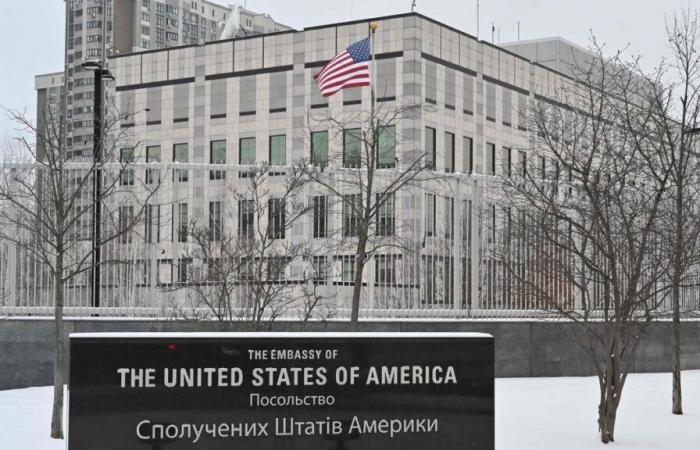Ukraine called on Western embassies which closed on Wednesday for fear of Russian bombings not to fuel tension, stressing that the threat of Russian strikes had been “daily” in the country since the start of the invasion.
• Also read: Canada temporarily suspends embassy services in Ukraine
• Also read: Ukraine launches its first US long-range missiles into Russia
At least five Western embassies, those of the United States, Spain, Italy, Hungary and Greece, announced that they would temporarily close for the day on Wednesday due to a threat of air attack, in the context of increasingly harsh rhetoric from Russia.
Aerial attacks by drones and missiles, sometimes massive, have been almost daily in Kyiv for weeks and have been very regular since the start of the war on February 24, 2024.
Anti-aircraft alerts also sounded in Kyiv several times during the night and day. Drones were shot down and no casualties were reported.
The closures of diplomatic representations on Wednesday follow a warning from the American embassy, which warned of a “possible significant air attack” on Ukraine.
“The threat of strikes (…) has unfortunately been a daily reality for Ukrainians for more than a thousand days,” responded Ukrainian diplomacy, denying that the risk would be higher on Wednesday.
She called on Westerners not to fuel “the tension” maintained for several days by Moscow, which has once again resorted to its nuclear rhetoric in the face of the green light given by Washington to American missile strikes on Russian territory.
Ukrainian military intelligence, the GUR, told him that Russia was carrying out a “massive psychological and informational attack” against Ukraine via messages circulating on social networks warning of imminent bombings.
The latest massive strikes on Ukraine on Sunday once again targeted the country’s energy system, causing power cuts. Since then, several residential buildings have also been hit across Ukraine, causing many deaths.
Mines and missiles
Russia has increased its warnings against Ukraine and the West in recent days, in response to the green light given by the United States to Kyiv to strike Russian soil with the long-range missiles delivered to it. .
A first attack of this kind, a strike targeting a military installation in the Russian region of Bryansk using American ATACMS missiles with a range of 300 km fired by Ukraine, took place on Tuesday, according to Moscow and Kyiv.
Departing before Donald Trump takes office in January, Joe Biden’s administration also announced on Wednesday its intention to supply Ukraine with antipersonnel mines, a type of weapon much criticized for the number of civilian victims that he provokes, even long after the end of conflicts. But this weapon could help slow down the advance of Russian troops, which is accelerating in the East.
The United States “is fully committed to prolonging the war in Ukraine and is doing everything it can to this end,” criticized Kremlin spokesperson Dmitry Peskov.
According to the American official, the mines supplied to Ukraine will be “non-persistent”, that is to say equipped with a self-destruction or self-deactivation device. They are intended to strengthen Ukrainian defense at a time when its troops are retreating on the front.
An anti-mine organization, the ICBL – winner of the Nobel Peace Prize in 1997 – condemned a “disastrous decision by the United States” and called on Ukraine to refuse to use this type of weapon.
“Irresponsible” nuclear rhetoric
In reaction to this American support for Kyiv, Russia has again issued nuclear warnings in recent days, while accusing the West of “wanting escalation”.
According to its new doctrine on the use of nuclear weapons, made official on Tuesday, Russia can now use them in the event of a “massive” attack by a non-nuclear country but supported by a nuclear power, a clear reference to Ukraine and in the United States.
This change “de facto excludes the possibility of defeating the Russian armed forces on the battlefield,” said the head of Russian foreign intelligence, Sergei Naryshkin, on Wednesday, suggesting that Russia would resort to the atomic bomb rather than risk defeat. in a conventional war.
Washington, Paris, London and the European Union have denounced an “irresponsible” attitude. Ukraine urged its allies “not to give in to fear.”
China, a crucial partner of Moscow accused of participating in its military effort, for its part called on “all parties” to “calm” and “restraint”.
On the ground, the Russian army continues to advance, claiming on Wednesday the capture of a new locality on the eastern front, near Kourakhové.
Russia is itself accused of escalation, now having, according to kyiv and the West, the support of at least 10,000 North Korean soldiers. North Korea is accused of also supplying large quantities of shells and missiles.






